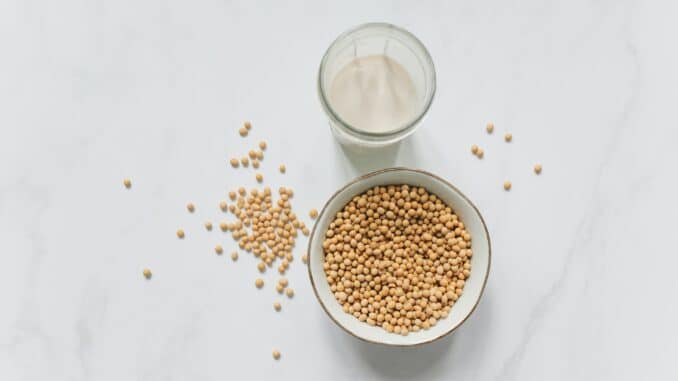
Soybeans are a type of bean that originated in Asia and are now widely consumed around the world. They’ve been a staple in Asian cuisine for centuries. They are primarily cultivated in Asia, South America, and North America nowadays. Followers of the vegetarian diet frequently substitute soy for meat. In addition to being a great source of protein, soybeans also boast many other health benefits. You can consume it in various ways, including food, beverages (such as milk replacements), and dietary supplements.
While whole soybeans bear massive consumption in Asia, Western countries tend to consume soy products that have undergone processing. For instance, you can pick up soy flour, protein, tofu, soy milk, soy sauce, or soybean oil. Antioxidants and phytonutrients found in soybeans have been linked to various health benefits. Soy oil can be extracted and used to create eco-friendly gasoline, candles, crayons, and motor lubricants, among other products. Read on to find out which types of powerhouse soy are healthiest to consume and why.
Nutritional Benefits of Soybeans
Image Source: https://cdn.pixabay.com/
Complete protein can be found in U.S. Soy foods. Because of this, it provides all nine of the body’s required amino acids. Those who are vegetarian or vegan rely heavily on it as their primary source of protein. 100 grams (g) of cooked green soybeans without salt, as reported by the United States Department of Agriculture (USDA), includes
Reliable Source of:
- Calories: 141
- 12.35 g of protein,
- 6.4% fat
- Carbohydrate content: 11.05 g
- 4.2 grams of fiber per serving.
Low in saturated fat and abundant in protein, vitamin C, and folate, soybeans are a healthy addition to any diet. It’s also an excellent way to get the following minerals:
- Calcium
- Iron
- Magnesium
- Phosphorus
- Potassium
- Thiamin
Image source: https://media.istockphoto.com
The processing and additives used by different producers can significantly alter the nutritional value of soy products. Soy is also rich in other plant compounds, including the following;
Isoflavones
Isoflavones, a polyphenol with antioxidant properties, have multiple beneficial effects. Isoflavone content in soybeans is significantly higher than in other commonly consumed foods.
Isoflavones are exceptional phytonutrients that mirror the female sex hormone estrogen. They are a type of chemical known as phytoestrogens (plant estrogens). Genistein (50%) daidzein (40%) and glycitein (10%) are the primary isoflavones in soy.
Acid Phytic
Phytic acid (phytate) in all plant seeds hinders the body’s ability to absorb minerals like zinc and iron. It can be diminished by soaking the beans overnight in water, sprouting them, or fermenting them.
Saponins
Saponins, one of the central family of plant chemicals in soybeans, are known to lower cholesterol in animals. People with a specific type of gut bacteria can turn daidzein into equol. The molecule is thought to be responsible for many of the health benefits associated with soybeans. Soy eating is believed to be significantly more beneficial for those whose bodies can manufacture equol than those who cannot (28Trusted source). More people in Asia and among vegetarians produce equal than the Western population.
Health Benefits of Soybeans
Image Source: https://cdn.pixabay.com/
Reduces Obesity
A 2019 study on rat body weight and soy isoflavone supplementation was carried out, and findings showed soybeans reduce weight in rats. The study authors state that specific soy isoflavone chemicals inhibited fat accumulation around the rats’ organs. According to the study, taking soy isoflavones supplements may help with weight management.
It May lower the risk of cancer
One of the biggest causes of death in contemporary civilization is cancer. Most observational research suggests that consuming soy products may lower the risk of breast cancer. Additional studies also show that men who consume soybeans may be protected from developing prostate cancer. It is also worth noting that some substances found in soybeans, such as isoflavones and lunasin, may have cancer-preventing properties. Early-life isoflavone exposure may prevent breast cancer in later life.
Symptoms of menopause are reduced
Image Source: https://cdn.pixabay.com/
The time in a woman’s life when menstruation ends is known as menopause. It is frequently accompanied by uncomfortable symptoms like sweating, hot flashes, and mood swings caused by a drop in estrogen levels. Interestingly, Asian women, particularly Japanese women, are less likely than Western women to experience menopause symptoms. This variation may be explained by dietary practices, such as the greater intake of soy foods in Asia.
Studies suggest that the family of phytoestrogens known as isoflavones, which are present in soybeans, may help to reduce these symptoms. Not all women are affected in this way by soy products. Only people with certain gut bacteria capable of converting isoflavones into equol are thought to benefit from soy. Many of soy’s health advantages might be attributed to equol.
Only equol producers who consumed 135 mg of isoflavones per day during a week, or 2.4 ounces (68 grams), saw a reduction in menopausal symptoms. Isoflavone supplements are popular today, although hormone therapy has historically been utilized to address menopausal symptoms.
Final Thought
A diversified and healthy diet that includes whole soy foods in moderate amounts may benefit your health. Particularly soy isoflavone supplementation can aid in lowering the risk of type 2 diabetes in both sexes and cancers linked to hormones, osteoporosis in women, and other diseases. More research is required to evaluate the full advantages and hazards of genetically modified and organic soy.

Leave a Reply